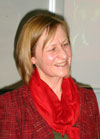| Feeding
for Optimum Performance
Lecture
with Dr. Teresa Hollands, Internationally renowned Equine Nutritionist.

Internationally renowned equine nutritionist, Dr Teresa Hollands
gave a very interesting and informative lecture recently at Nottingham
Trent University's Brackenhurst campus on Feeding for Optimum Performance.
Dr Hollands started by stating that the basic principles of feeding
were the same for all disciplines, whether Driving, Eventing or
Endurance, with fibre being the foundation of all rations and its
relationship to cereals then discussed.
Lack of fibre in the diet, resulting in gastric ulcers and colic,
was the thread running through the lecture. Teresa stated that
horses chew hay once a second equating to three thousand six hundred
chews per kilogram. A diet of 80% forage:20% concentrate will keep
them occupied for approximately sixteen hours a day and they will
remain happy and healthy. Concentrates take far less chewing and
therefore diets with increased levels of concentrates over forage
will occupy the horse for less time during the course of the day.
Recent studies have revealed in racehorses that the high cereal,
low forage diet leaves the horse with up to ten hours spare. The
consequent boredom leaves horses to develop stereotypic behaviour
such as wind sucking and crib-biting. In addition, 75% of racehorses
and 70% of sport horses show signs of gastric ulcers.
The trend towards increased use of haylage over hay can also cause
difficulties. Wetter haylage needs to be fed in higher quantities
than hay to meet the same level of dry matter from forage in the
diet.
Ad-lib principles were generally advised by Dr
Hollands, the term "heating" was
then discussed at length and judged misleading especially in relation
to feeding oats. And heat, (warmth) being produced in the hind
gut from increased fibre digestion.
Obesity and its dangers were then discussed with fat being undesirable
in the modern competition horse as it cannot be converted to muscle.
Calories, not energy, will be used to express the nutrients in
horses' diets in future as this will be easier to understand.
Dr Hollands summed up by saying that quality as well as quantity
needed analysis in feeding. In addition, giving horses daily turnout,
that is, trickle feeding was key in maintaining healthy gut function.
A lively question and answers session finished the evening where
optimum feed to exercise time was raised in horses exerting themselves.
Two hours was said to be needed, but in endurance work the time
could be much less.
Dr Hollands was thanked by Heather Owen, academic team leader
for the university's School of Animal, Rural and Environmental
Sciences, for her lecture.
The next lecture in the series at Brackenhurst
will be with Andy Bathe MRCVS on Equine Sports Injuries and Rehabilitation
on Thursday 15 th February. To download and application form click
here. Or for more information and tickets, please contact
Zoe Cobb on 01636 817026 or visit www.ntu.ac.uk/ares/equestrian_centre.
Return to Hoyland Event main site
|